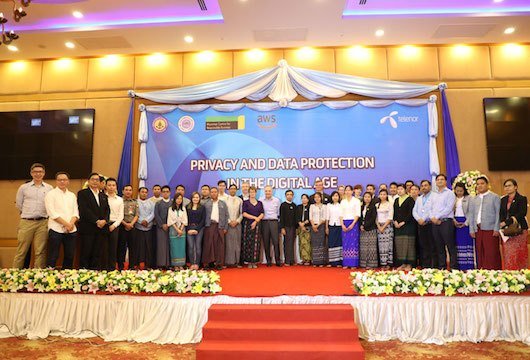
Various speakers at a data privacy workshop in Myanmar urged the government to adopt cyber security policies that offer strong data protection for citizens but enable data to flow freely across borders.
The workshop – hosted in Naypyitaw last week by Telenor Myanmar – invited government officials and the ICT industry to come together to discuss how government, business and consumers in Myanmar could benefit from a modern comprehensive data protection and cyber security regulatory framework. Industry speakers highlighted regional and global trends in the market for ICT services, including data storage in the cloud, and the role of governments in protecting privacy and cyber security.
Vicky Bowman, Director of Myanmar Centre for Responsible Business, highlighted the need for Myanmar to develop a comprehensive people-centered cyber security framework, including an effective and modern data protection law.
“Cyber security is a ‘public good’, like clean air and water, which is why government action is needed,” Bowman said. “Laws and policies to protect users’ data need to be risk-based and future-proofed, which means focusing on outcomes, rather specifying a particular ICT type. Otherwise they will soon be out of date”.
Other speakers at the workshop also argued that allowing data to flow freely across borders – for example, to enable storage in the cloud outside the country in which it is generated – will benefit governments, and traditional and digital industries and boost economic growth and innovation.
It allows them to take advantage of the latest hardware and software available, rather than investing scarce capital in rapidly outdated systems, and seek ICT services from the most efficient provider. It also makes systems more resilient and less vulnerable to hacking or other damage.
Facilitating cross-border data flows is also necessary if Myanmar is to develop its own ICT service industry.
Speakers recommended that regulators and policy makers establish data protection requirements to facilitate the free flow and safe storage of data. These should draw on international experience, but not be a copy-paste of outdated or inappropriate instruments such as the 2001 Budapest Convention on Cyber-Crime.
Myanmar is currently establishing a data ID card system, digital government strategy and e-government system, according to its 12-point economic policy.
Hans Martin Henrichsen, chief corporate affairs officer of Telenor Myanmar, said the cellco organized the workshop to establish public dialogue between the private and public sector to develop a regulatory framework that protects user privacy while providing them security when they are online.
Earlier this year, Telenor Myanmar released its first ever Digital Myanmar report, which outlined its plans to support the government’s Digital Myanmar Economy Plan. Among other things, the report made a series of recommendations to the government to implement digital laws, alongside laws on data protection, digital privacy, intellectual property rights and e-commerce protecting the rights of businesses and citizens.

Be the first to comment